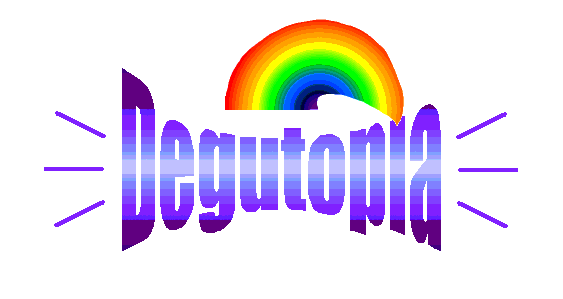|
Agouti
coat |
Degus are close relatives of the Chinchilla and Guinea Pig, originating in central Chile. Degus are fascinating creatures and continue to be studied, with researchers finding fascinating facts such as their UV reflecting belly fur, their dichromatic vision and their communal nesting and adoption habits. |
|
A
long, black tail |
One unique feature of the degu is their furry tail, complete with a brush at the tip. The tail is used for balance (degus are highly agile) and communication, although they can shed it in order to escape predators. For this reason degus cannot be picked up by the tail as it can break off and will not grow back. |
|
Orange
teeth |
Degus have orange enamel on their teeth as a result of dietary enzyme action. Incisor colour can be used as an indicator of health, as degus who are ill or have a poor diet often have white teeth (although there are exceptions, such as in young degus). The teeth continuously grow and need to be constantly worn down by chewing. |
|
Their
diet must |
Unlike other mammals, degus cannot regularly eat foods containing sugar, as they are prone to developing diabetes. This is because they have a different way of metabolising sugar than other animals. Care must be taken that their food is sugar free in order to avoid this. Degus also need to eat a lot of hay in order to keep their gut functioning healthily. |
|
In
social groups |
Degus are highly social animals and rely on other degus in their group for company. Degus should be housed in at least same-sex pairs in order to prevent them becoming depressed and even physically ill (wild degus live in social groups of around 6). Care should be taken that your degus are both the same sex as opposite sexes will breed, unless the male has been neutered. Information on sexing can be found on our site. |
|
To
keep fur clean |
Regular sand baths are taken by degus in the wild to keep their fur in good condition and to satisfy behavioural needs. Captive degus should be offered a bowl of Chinchilla dusting clay several times per week to let them bathe. Degus are also highly intelligent and are easy to train for a food reward, and since they use a wide range of sounds to communicate they easily learn voice commands. |
|
Intelligent,
brave, |
Degus make amazing pets as they have personalities far larger than themselves, and readily bond with humans who spend a lot of time with them. They are hugely entertaining characters and will never fail to make your heart laugh, melt, or wonder at these fantastic creatures. If you're looking for a pet that's bubbly, fun and has a bit more to give back, then degus are for you! |

